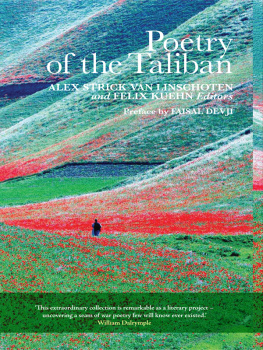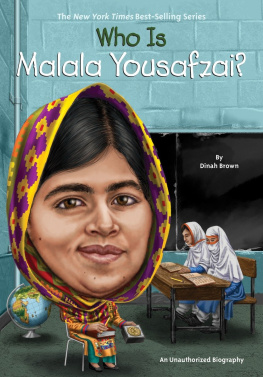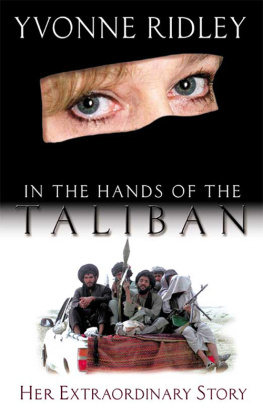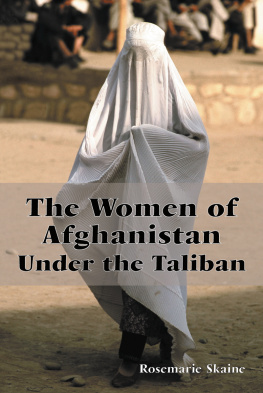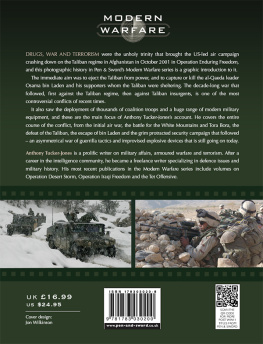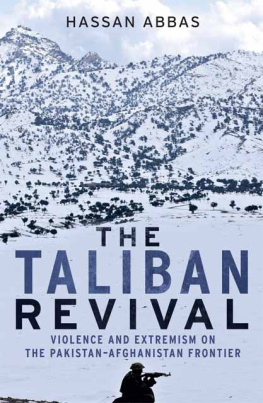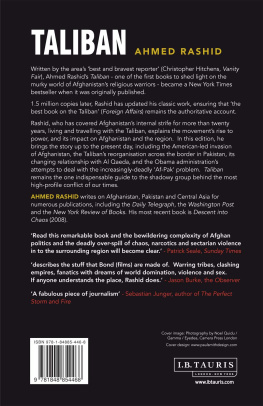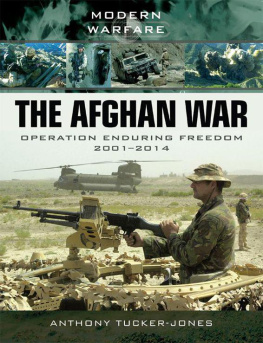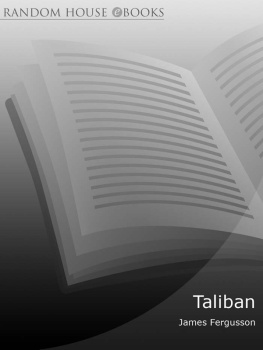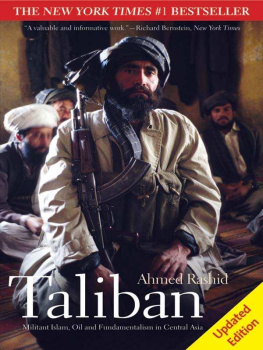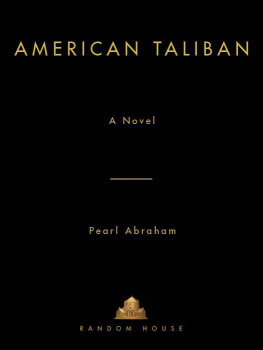Taliban - Poetry of the Taliban
Here you can read online Taliban - Poetry of the Taliban full text of the book (entire story) in english for free. Download pdf and epub, get meaning, cover and reviews about this ebook. City: New York;Afghanistan, year: 2012, publisher: Christopher Hurst and Company;Columbia Univ. Press, genre: Religion. Description of the work, (preface) as well as reviews are available. Best literature library LitArk.com created for fans of good reading and offers a wide selection of genres:
Romance novel
Science fiction
Adventure
Detective
Science
History
Home and family
Prose
Art
Politics
Computer
Non-fiction
Religion
Business
Children
Humor
Choose a favorite category and find really read worthwhile books. Enjoy immersion in the world of imagination, feel the emotions of the characters or learn something new for yourself, make an fascinating discovery.
- Book:Poetry of the Taliban
- Author:
- Publisher:Christopher Hurst and Company;Columbia Univ. Press
- Genre:
- Year:2012
- City:New York;Afghanistan
- Rating:5 / 5
- Favourites:Add to favourites
- Your mark:
- 100
- 1
- 2
- 3
- 4
- 5
Poetry of the Taliban: summary, description and annotation
We offer to read an annotation, description, summary or preface (depends on what the author of the book "Poetry of the Taliban" wrote himself). If you haven't found the necessary information about the book — write in the comments, we will try to find it.
Taliban: author's other books
Who wrote Poetry of the Taliban? Find out the surname, the name of the author of the book and a list of all author's works by series.
Poetry of the Taliban — read online for free the complete book (whole text) full work
Below is the text of the book, divided by pages. System saving the place of the last page read, allows you to conveniently read the book "Poetry of the Taliban" online for free, without having to search again every time where you left off. Put a bookmark, and you can go to the page where you finished reading at any time.
Font size:
Interval:
Bookmark:
POETRY OF THE TALIBAN POETRY of the TALIBANTranslated by Mirwais Rahmany & Hamid Stanikzai Edited and introduced by Alex Strick van Linschoten & Felix Kuehn Preface by Faisal Devji  Columbia University Press New York For S. Columbia University Press Publishers Since 1893 New York cup.columbia.edu Introduction and editing Alex Strick van Linschoten and Felix Kuehn, 2012 Preface Faisal Devji, 2012 All rights reserved. E-ISBN 978-0-231-80116-4 Library of Congress Cataloging-in-Publication Data Poetry of the Taliban / translated by Mirwais Rahmany & Hamid Stanikzai ; edited and introduced by Alex Strick van Linschoten & Felix Kuehn ; preface by Faisal Devji. p. cm. Includes bibliographical references and index. paper) ISBN 978-0-231-80116-4 (e-book) 1. paper) ISBN 978-0-231-80116-4 (e-book) 1.
Columbia University Press New York For S. Columbia University Press Publishers Since 1893 New York cup.columbia.edu Introduction and editing Alex Strick van Linschoten and Felix Kuehn, 2012 Preface Faisal Devji, 2012 All rights reserved. E-ISBN 978-0-231-80116-4 Library of Congress Cataloging-in-Publication Data Poetry of the Taliban / translated by Mirwais Rahmany & Hamid Stanikzai ; edited and introduced by Alex Strick van Linschoten & Felix Kuehn ; preface by Faisal Devji. p. cm. Includes bibliographical references and index. paper) ISBN 978-0-231-80116-4 (e-book) 1. paper) ISBN 978-0-231-80116-4 (e-book) 1.
Pushto poetry20th centuryTranslations in English. 2. Pushto poetry21st centuryTranslations in English. 3. Taliban members writings, Pushto. I.
Strick van Linschoten, Alex. II. Kuehn, Felix, 1979- III. Rahmany, Mirwais. IV. V. V.
Devji, Faisal. PK6814.5.E54P64 2012 891.5931dc23 2012009947 A Columbia University Press E-book. CUP would be pleased to hear about your reading experience with this e-book at . References to Internet Web sites (URLs) were accurate at the time of writing. Neither the author nor Columbia University Press is responsible for URLs that may have expired or changed since the manuscript was prepared. Publishers Note The Editors and Publishers have made every effort to identify the authors of the poems published in this collection.
If we have incorrectly attributed authorship of any of the poems we shall be pleased to correct the error in our next printing of the volume. Contents The Poems Mirwais Rahmany was born in Rodat district of Nangarhar province in 1983. He learnt English from his father at an early age. Rahmany fled to Pakistan in the late 1980s on account of the Soviet invasion. He returned to Kabul following the mujahedeen victory, but settled in Herat after the civil war broke out among various jihadi groups. In 2001 he began his medical studies at Herat University, from which he graduated in 2008.
During this time he also worked as an English teacher in Herat. Most recently, he has done work as a specialised legal translator. He continues to live in Herat. Abdul Hamid Stanikzai was born in Deh Bali, Kapisa province. He lived there for three years before moving to Kunduz province. Eventually, his parents moved permanently to Kabul.
He started school in 1979, and by 1989 enrolled in Kabuls Police Academy. He started his first official job as a computer operator in the Cartography Head Office in 2001. Following that he began translating and writing and is currently studying for a BBA at the Dunya Institute of Higher Education and French at the Lyce Esteqlal in Kabul. He has translated a wide variety of documents, from project manuals, electoral laws and procedures, codes of conduct and so forth, between English, Pashto and Dari. ABOUT THE EDITORS A graduate of the School of Oriental and African Studies (BA Arabic and Persian), Alex Strick van Linschoten first came to Afghanistan six years ago as a tourist. In 2006, together with Felix Kuehn he founded AfghanWire, an online research and media-monitoring group to give a more prominent voice to local Afghan media.
During this time he worked on a translation of the last book of poems published by Nadia Anjuman before her death, Smoke-veined Flower. In spring 2010 he published My Life With the Taliban, of which he was a co-editor, to critical acclaim. In early 2012 he published An Enemy We Created, a history of the relationship between the Afghan Taliban and al-Qaeda, together with Felix Kuehn. He is currently working on a book and PhD at the War Studies Department of Kings College London on the identity of the Afghan Taliban movement 19782001. He has worked as a freelance journalist in Afghanistan, Syria, Lebanon and Somalia, writing for Foreign Policy, International Affairs, ABC Nyheter, The Sunday Times, Globe and Mail and The Tablet. Felix Kuehn first travelled to Afghanistan some five years ago, having spent several years in the Middle East including a short twelve months in Yemen, where he first learnt Arabic in 2002. Felix Kuehn first travelled to Afghanistan some five years ago, having spent several years in the Middle East including a short twelve months in Yemen, where he first learnt Arabic in 2002.
In 2006, together with Alex Strick van Linschoten he founded AfghanWire, an online research and media-monitoring group to give a more prominent voice to local Afghan media. In spring 2010 he published My Life With the Taliban, for which he was a co-editor, to critical acclaim. In early 2012 he published An Enemy We Created, a history of the relationship between the Afghan Taliban and al-Qaeda, together with Alex Strick van Linschoten. Felix holds a degree from the School of Oriental and African Studies (BA Arabic and Development Studies). ABOUT FAISAL DEVJI Faisal Devji is University Reader in Modern South Asian History at St Antonys College, University of Oxford. He has held faculty positions at the New School in New York, Yale University and the University of Chicago, from where he also received his PhD in Intellectual History.
Devji was Junior Fellow at the Society of Fellows, Harvard University, and Head of Graduate Studies at the Institute of Ismaili Studies in London, from where he directed post-graduate courses in the Near East and Central Asia. He sits on the editorial board of the journal Public Culture. Devji is the author of three books, Landscapes of the Jihad: Militancy, Morality, Modernity (Hurst, 2005), The Terrorist in Search of Humanity: Militant Islam and Global Politics (Hurst, 2009) and The Impossible Indian: Gandhi and the Temptation of Violence (Hurst, 2012) and is currently writing a book on the emergence of Muslim politics and the founding of Pakistan. He is interested in the political thought of modern Islam as well as in the transformation of liberal categories and democratic practice in South Asia. Devjis broader concerns are with ethics and violence in a globalised world, particularly with the thought and practices of Mahatma Gandhi, who was among the earliest and perhaps the most perceptive commentator on this predicament of our times. This book began its life as a hobby and, as such, we tinkered with the poems for several years before considering whether to compile them for publication.
In doing so we were fortunate enough to make the acquaintance of many Afghans and non-Afghans who deepened our understanding of the Taliban movement and Afghanistan itself. At the top of this list are friends in and from loy Kandahar. The sensitivity of this project means it is inadvisable to list names. We hope you know who you are, and that we would not be able to do our work in southern Afghanistan without you. Most poems were initially translated for the AfghanWire website and media-monitoring service. We were assisted by four excellent translators at that time, and we thank them for their hard work.
At a later stage, M. M. helped gather most of the pre-2001 poems for us; this included large numbers of transcriptions from tapes, and we thank him for his work. We had useful conversations around the edges of this project with various specialists, all of whom helped us in various ways: Orzala Ashraf, Erin Cunningham, Huma Imtiaz, Tom Johnson, Daniel Kimmage, Thomas Hegghammer, Joanna Nathan, Michael Semple, Joshua White and Aaron Zelin. Staff at Hurst were always welcoming and helpful. Thanks to Jon de Peyer, Daisy Leitch, Rob Pinney and Radha Spratt.
Next pageFont size:
Interval:
Bookmark:
Similar books «Poetry of the Taliban»
Look at similar books to Poetry of the Taliban. We have selected literature similar in name and meaning in the hope of providing readers with more options to find new, interesting, not yet read works.
Discussion, reviews of the book Poetry of the Taliban and just readers' own opinions. Leave your comments, write what you think about the work, its meaning or the main characters. Specify what exactly you liked and what you didn't like, and why you think so.

